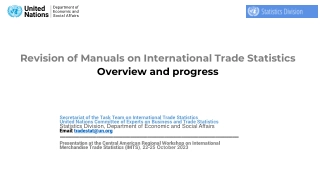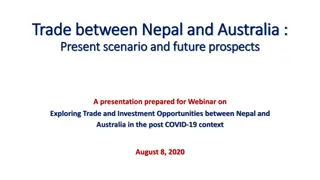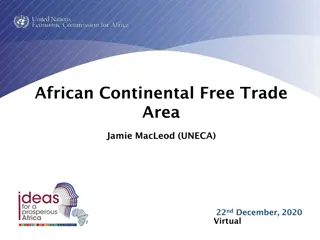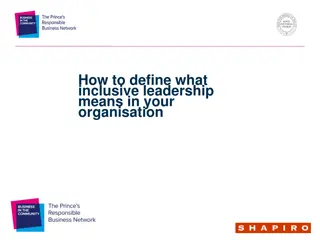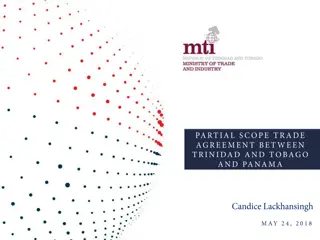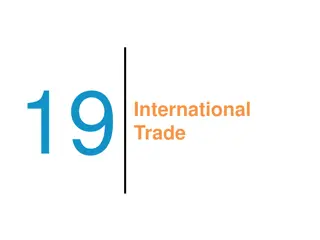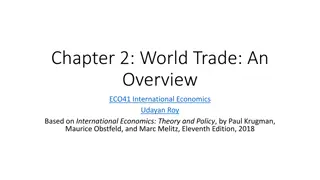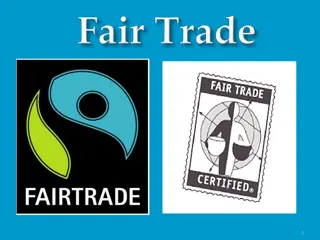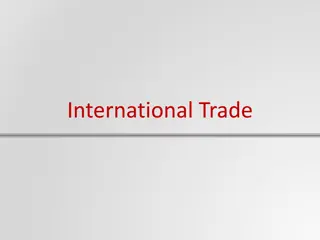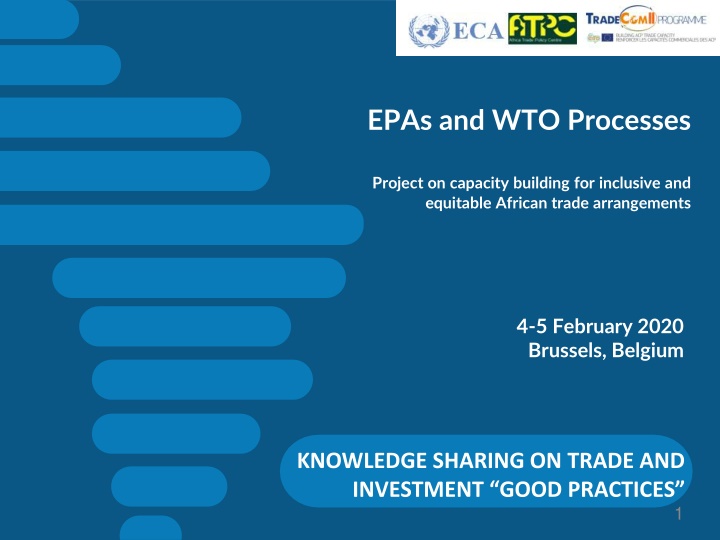
Capacity Building for Inclusive African Trade Arrangements
Strengthening capacity for policymaking and private sector engagement in trade policies to enhance Intra-African trade and Africa's global trade share. Addressing challenges in African trade such as low global trade representation and supply constraints to maximize the benefits of trade agreements. Focus on promoting inclusive and equitable trade practices through enhanced policy space and industrial development.
Download Presentation

Please find below an Image/Link to download the presentation.
The content on the website is provided AS IS for your information and personal use only. It may not be sold, licensed, or shared on other websites without obtaining consent from the author. If you encounter any issues during the download, it is possible that the publisher has removed the file from their server.
You are allowed to download the files provided on this website for personal or commercial use, subject to the condition that they are used lawfully. All files are the property of their respective owners.
The content on the website is provided AS IS for your information and personal use only. It may not be sold, licensed, or shared on other websites without obtaining consent from the author.
E N D
Presentation Transcript
EPAs and WTO Processes Project on capacity building for inclusive and equitable African trade arrangements 4-5 February 2020 Brussels, Belgium KNOWLEDGE SHARING ON TRADE AND INVESTMENT GOOD PRACTICES 1
2 Project Summary Capacity building for inclusive and equitable African Trade Arrangements Title of the action: ECA Member Countries, CP countries 24 months 2,578,767 Euro Location(s) of the action: Total duration of the action: Requested EU contribution (amount) Requested EU contribution as a percentage of total eligible costs of the action (indicative) Objectives of the action 80% Overall objective: Contribute to enhancing Intra-African trade and Africa s share of global trade. Specific objective: A more inclusive trade policy making process and higher returns from trade for African countries African governmental institutions, African Regional Economic Communities, African private sector institutions Public and private sector of Africa Outcome 1. Strengthened capacity of policymakers for adoption of inclusive and equitable trade policies. Target group(s) Final beneficiaries Estimated results Outcome 2. Increased capacity of African private sector to take better advantage of preferential trade agreements/arrangements. - - - Trade policy research on intra-Africa and intra-ACP and Africa-EU trade. Main activities Technical assistance in external trade policy and strategy development. ATPC 2018 Financial Report | Receivables UNECA.ORG Capacity-building of African private sector and national trade support institutions to take advantage of RTAs.
Background Africa s share in global trade is less than 3% and made up largely of commodities; Over 65 % of African exports to the EU are primary goods (food and drink, raw material and energy). Trade among african countries is also very low at around 17%, AFCFTA to change this. In 2018, 70 % of goods exported from the EU to Africa were manufactured goods; Although market access to other african countries ( bilateral agreements and Regional trading agreements) and developed countries (EBA, GSP, EPA, AGOA) exist, most African countries don t have the capacity to take advantage of the preferential market access; Supply side constraints; Weak trade Support Institutions; Lack of infrastructure and weak production base; WTO Reforms should promote development and inclusiveness, and include the common interests of Africa. WTO reforms should ensure adequate policy space to support Africa s integration and industrialisation and other key objectives that promote inclusive and equitable trade. UNECA.ORG
Background African countries are moving towards the implementation of the AfCFTA; The AfCFTA entered into force on 30 May 2019 having been ratified by the required 22 countries. 54 countries have signed, and 29 countries have ratified the AfCFTA. The AfCFTA provides the opportunity for Africa to create the world's largest free trade area by number; Population of 1.2 billion people, Combined GDP $2.5 trillion economic bloc and usher in a new era of development; Growing middle class with disposable income; The AfCFTA has the potential to generate a range of benefits through supporting trade creation, structural transformation, productive employment and poverty reduction. This project aims to strengthen the capacity of policymakers to adopt inclusive and equitable trade policies in implementing the AfCFTA and ensuring that the Private sector has the capacity to take advantage of the preferences. UNECA.ORG
Project interventions Key studies i) the African private sector to take better advantage of e-commerce in preferential trade agreements and arrangements-EAC; Study on E-Commerce Provisions in PTA s to strengthen the capacity of ii) traders with a view to strengthen the capacity of both private and public sector actors to support informal traders to better tap into preferential market access opportunities and gradually formalize their trade, with focus on ECOWAS; Study on Extending the benefits of free trade to informal cross border iii) strengthen the capacity of the African private sector to better engage in the negotiation and implementation of preferential trade agreements and arrangements, and particularly those relating to trade in services, with focus on ECCAS; Study on Negotiating Institutions: Putting in the Right Foundations to UNECA.ORG
Project interventions Key studies iv) capacity of the African private sector to comply with and take better advantage of preferential trade agreements and arrangements (emphasize on TBT and SPS), focusing on Southern Africa. Study on Preferential Trade Agreement Compliance to strengthen the v) vulnerable groups within the private sector, the constraints they face, and where support to improve the use of PTAs should be prioritized, with continental focus. Study on PTA utilization by the private sector in Africa, and particularly These studies will take into account issues on regional trade agreement, Economic Partnership Agreements arrangements that African countries are beneficiaries of. and other preferential trade UNECA.ORG
7 Methodology of implementation Increased capacity and skills of policy makers to make inclusive policies to increase trade, gender and youth sensitive Increase utilisation of preferences in FTAs by the private sector PROJECT OUTCOMES Policy reforms Private Sector engagement Increased trade Policy briefs, training programmes for policy makers and private sector , policy dialogues, technical assistance, etc PROJECT OUTPUTS Studies Regional FTA s & EPA issues Capacity Building (tailored) >125 people participants Validation of Studies to ensure that they respond to specific issues in the regions Working with RECs and Private Sector Policy Briefs Inclusion & equity issues 5 Regional studies on Ecommerce, Trade Institutions, Informal Cross border Trade, Standards and PTA utilisation Partnerships with IDEP, TRALAC and TRAPCA Technical Assistance UNECA.ORG
8 Key considerations in implementation Africa s priority trade policy objective is the AfCFTA that will build a Single African Market for Trade in Goods and Services, and it is critical to ensure that WTO outcomes do not undermine those objectives; ECA supports Africa's quest for a Multilateral Trading System that is fair, equitable, inclusive and development-oriented, and that prioritises development interests; ECA has other projects that are supporting African members States in developing national AfCFTA implementation Plans; ECA is implementing other projects that are aimed at collecting gender disaggregated data- supporting and enabling evidence based policy making; ECA will continue to support African member Staates in developing common negotiating positions at the WTO Strategy Retreats for African Ambassadors based in Geneva; ECA will support the implementation of the AfCFTA as the anchor for trade growth in Africa and as a mechanism to strengthen trade governance and rules based trading system. UNECA.ORG
ECA THANK YOU! more info: bchikwene@un.org UN.ORG

